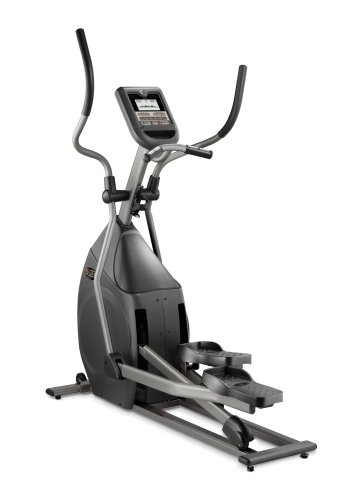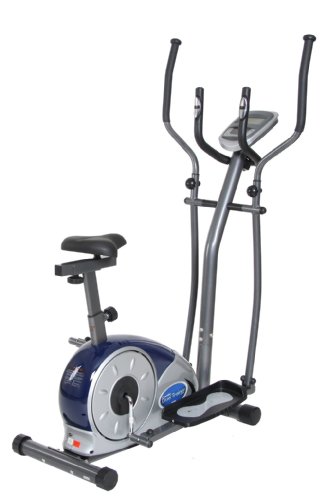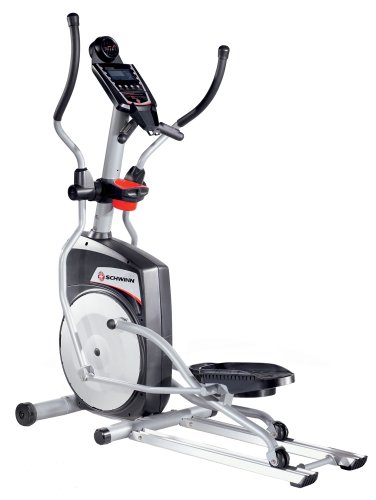Starting somewhere around 0 are the lesser quality elliptical cross trainers. As the price range increases, so does the overall quality of the machine, as well as the features offered. It is fair to assume you will not receive the same value and quality when paying 0 as opposed to paying 00 or even 00. However, what are the chances you are going to purchase the 00 professional cross trainer? These are typical of public gyms, health clubs, and fitness spas. By acknowledging both the benefits as well as the shortcomings of the lower priced cross trainers, you are able to make a better selection out of the elliptical trainers available, finding the trainer best suited to your personal fitness level.
People are choosing elliptical workouts over treadmills and cycling due to the low impact, but intensive cardiovascular workout. Focusing on lower body elliptical movement, your legs and heart muscles gain a beneficial workout. The same effect could be accomplished running in place without a machine, resulting in high impact exercising. Clearly, your body does the work of exercising, not the machine. This is why it is imperative that you choose a good quality machine that enables you to maximize the exercise you have chosen to perform on a fitness machine.
To be completely honest, running in place tends to become extremely monotonous. The cross trainers offer an impressive feature, varying resistant levels, that encourage a more intense elliptical workout. Although both inexpensive and expensive trainers are equipped with this feature, the higher priced and better quality cross trainers are preprogrammed to adjust the resistance level in random intervals during your workout. The lower priced and poor quality elliptical trainers may require you to manually change the resistance, resulting in interrupting your workout.
Compare the multiple features on the LCD displays and the monitor feedback as well. The standard monitoring featured is pulse rate, distance, duration of workout, and calories burned. All of these features, truthfully, have little or no reliability for accuracy. The chest strap heart monitor is, by far, a more efficient option offered on higher quality trainers, or available where exercise equipment is sold.
When figuring the calories burned during a workout, the monitor is essentially flawed. Your current weight and the intensity of your elliptical workout is what determines your calories. Therefore, if a person weighing 180 pounds works out at the same intensity as a person weighing 260 pounds, the higher weight person will burn more calories and unless the cross trainer is able to be programmed at your current weight, the results will be false.
Incidentally, the computerized system governing the monitoring of your calories burned, etc. would probably not function any differently on a lesser quality cross trainer than as an expensive model. It is a convenient "extra" but try not to depend on it as the determining factor in your final decision.
The stability of the machine is another leading factor that requires attention. The higher the purchase price often ensures better quality. Your height and weight will contribute to narrowing down your choices. If your are over 6 feet tall or over 175 pounds, you may want to consider a better quality cross trainer that is heavier and increases the safety usage level. Anyone under that height and weight may feel secure on a lighter cross trainer, weighing about 80 - 90 pounds.
The materials used to construct the lesser quality machines are undoubtedly low quality. The mandatory hardware, being low quality, will not perform as well. They will need additional tightening at later (possibly frequent) maintenance dates. You could opt to exchange the original hardware with better quality nuts, bolts, and washers if you care to invest your time in that way. Due to the low quality of materials involved, you will find it necessary to perform routine maintenance more often.
The warranty will also need to be carefully considered. On the lesser quality cross trainers, the customary warranty will only cover 90 days at most, as opposed to the better quality machines that offer a 1 year warranty for labor and a 3 year warranty for parts. The wisest course of action for any "noise" repairs, parts, or any malfunctions in general, would be dealing directly with the manufacturer.
Determining the amount of calories you burn in any exercise is a function of the intensity of the exercise and your current body weight. A 150 pound person will burn fewer calories per minute of exercise than a 250 pound person even if they match each other exactly in intensity. So unless the calories burned monitor on whatever elliptical trainer you buy has accounted for your current body weight it is almost certainly wrong. With the right information you can easily and accurately determine your calorie expenditure for any physical activity from a chart or with a quick calculation.
The bottom line here is that the monitoring system on a cheap elliptical trainer will probably be no worse than the monitoring system on a more expensive model, and unless you are willing to spend ,000 plus for an elliptical trainer the monitoring system is only incidental and should not be a major consideration at all.
The primary limitation of cheap elliptical trainers then is their sturdiness, construction quality, and warranty period. If you weigh 250 pounds then you cannot reasonably expect an 80 pound elliptical trainer to feel solid under your feet. The same cheap elliptical trainer would probably feel very comfortable to a 125 pounder. Your height and body weight are the primary considerations here. An arbitrary cut off point for consideration of a cheap elliptical trainer may be more than six feet in height or more than 175 pounds of body weight.
Another primary consideration is your intended intensity of use. Most people can begin to achieve a cardio training effect at about walking speed plus half. That would be roughly equivalent to the pace of a 10 minute mile. If you do not intend to work your elliptical trainer much harder than that it will probably stand up to constant use. If you intend to pound the machine at the upper limits of your maximum safe heart rate that would probably stress a cheap elliptical trainer into breakdown.
Even with non abusive use, because a cheap elliptical trainer will by definition be built from cheaper materials, you have to expect to perform more maintenance. Supplied nuts and bolts will be lower grade, probably without adequate lock washers, and they will require occasional tightening. If you're handy you can change out the hardware for fine thread bolts and nylon nuts during assembly. If the very idea of tightening a bolt and nut is beyond you then you must factor that into your decision making. Assume that a cheap elliptical trainer will require occasional lubrication and maintenance.
Lastly is the warranty period. 90 days is probably the best you can expect. A cheap elliptical trainer is going to be noisier to begin with than a gym model so put it through its paces early and listen for different or unusually loud noises. Deal only with a manufacturer and seller that will stand by their warranty if there is a problem.
 | Price : $499.99
| Price : $499.99










